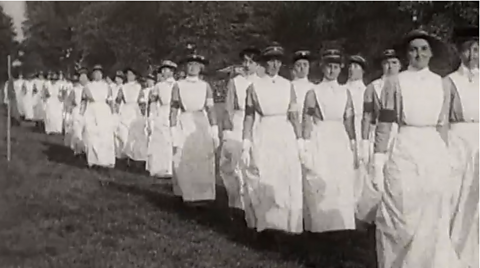
This collection brings together a selection of five short films from the BBC's archives, to help illustrate some of the changes in women's rights in the UK during the 20th century.
Featuring information on the Suffragettes, women at work during World War One, changing rights in the 1960s and feminism, the collection includes some first-hand testimony from women at the time.
Some of the films in this collection were first shown as part of the BBC Wales series, Hidden Heroines.
These clips are relevant for teaching History at KS3 in England, Wales and Northern Ireland and at third level in Scotland.
Please note, some of the clips in this collection contain archive footage of World War One, including some images of soldiers firing military weapons and explosions. We advise teacher review before showing to your class.

Votes for women: a Suffragette remembers
Jobs during the First World War
The changing role of women in the 1960s
An archive clip about the Suffragettes, featuring an interview with Muriel Matters, an ex-Suffragette recounting her actions and how the authorities reacted.
An archive clip exploring how the First World War changed the type of work women did. By 1918, five million women were working in Britain.
Archive demonstrating how a boom in jobs available for women in the 1960s created greater financial independence.
Demanding equal rights - women in the workplace
Politics and Feminism
An archive clip exploring how the equality between different people in society has developed over time, and the impact of the Education Act of 1880.
An archive clip that shows some of the changes to women's rights during the 20th century, for example it wasn't until 1928 that women over 21 could vote.
Teacher Notes
After watching the clips, students could be encouraged to discuss in small groups how the rights of women have changed during the 20th century. Students could be asked to consider what the women of 100 years ago would think about the role and position of women in today’s society. What would they be proud of? What would they still be fighting for today?
As a creative task, they could be encouraged to create a poster that they might have made had they been supporting (or challenging) women's rights at a certain period in history - for example, a poster for the Suffragettes.
Students could carry out further research into the Suffragettes, or they could be given different characters e.g. Lydia Becker, Millicent Fawcett, David Lloyd George, Annie Kenney, policeman etc. and create a conversation between them about their feelings/attitudes towards women’s suffrage.
Students could be presented with a collage of images showing direct action by the Suffragettes and the authorities' response to this. On sticky notes or strips of paper, students could write key words and phrases to describe the images.
Curriculum Notes
These clips are relevant for teaching KS3 History in England, Wales and Northern Ireland and third level in Scotland.